The laws and resolutions discussed and passed at the session are very important and are the foundation for restructuring the apparatus, preparing for a new phase with a streamlined, effective, efficient and productive apparatus.
The National Assembly is holding an extraordinary session with a focus on streamlining the apparatus in accordance with Resolution 18 of the Central Committee. Speaking with Giao Thong Newspaper, delegate Trinh Xuan An, full-time member of the National Assembly's Defense and Security Committee, said that in order for the new apparatus to immediately get into work and not leave any gaps, it is necessary to innovate operating methods to ensure effectiveness and efficiency.
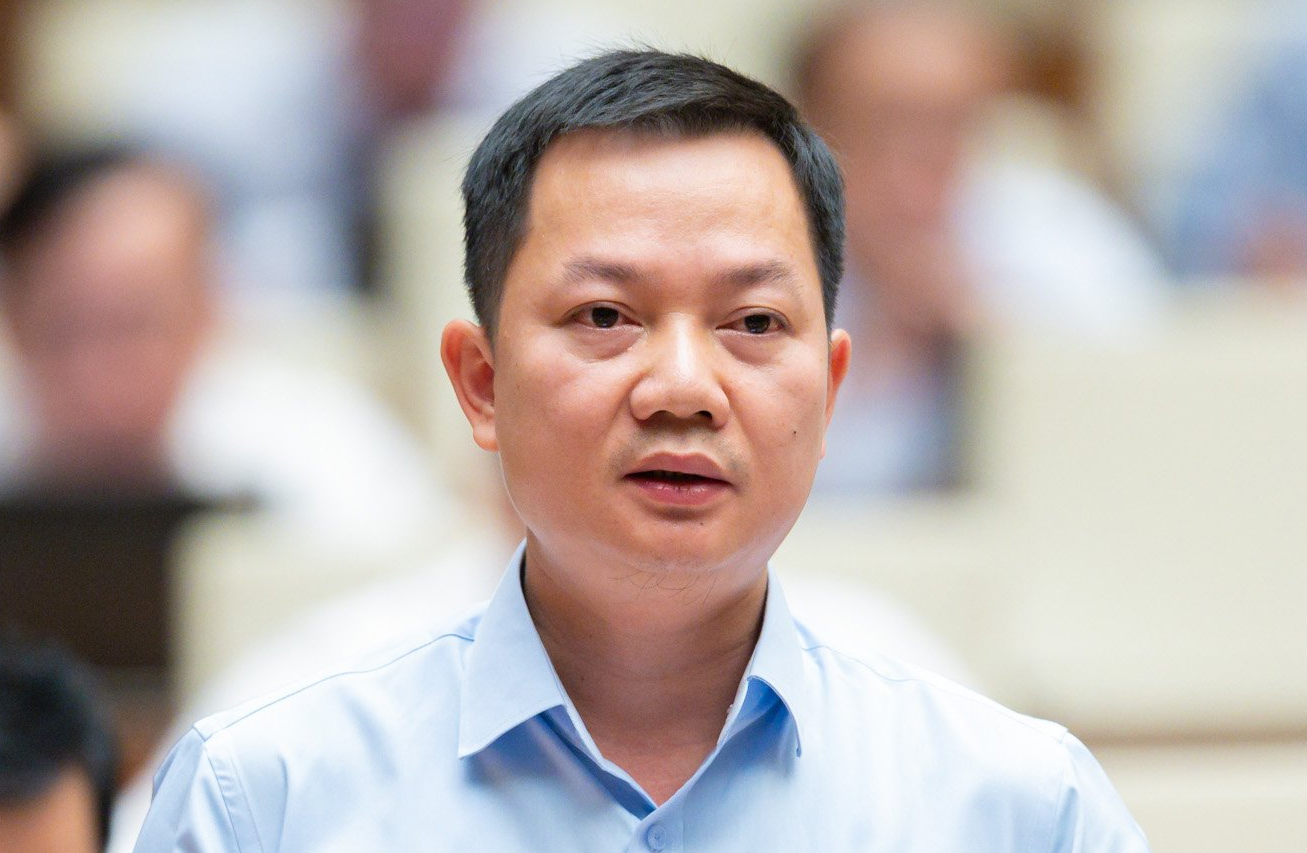
National Assembly Delegate Trinh Xuan An.
Solid legal foundation
The revolution in organization and apparatus is being implemented very vigorously and has received high consensus from party members and people of all walks of life. In your opinion, what is the significance of the draft laws and resolutions passed by the National Assembly at this session?
The laws and resolutions discussed and passed at this session are all very important, laying the foundation for restructuring the apparatus, preparing for a new phase with a streamlined, effective, efficient and productive apparatus.
If we call building laws and institutions as removing "bottlenecks of bottlenecks", then this is the starting point for us to start doing other important tasks. Because these laws are all related to the apparatus, people, institutions, and procedures.
For example, amending the Law on Promulgation of Legal Documents, this is "the law that makes the law", that makes the institution. To remove the institution, clear the bottleneck, we must amend the content that makes the institution.
In my opinion, we are doing the right thing and using the right method to move to a new stage of development for the country.
These draft laws are of special importance, not only politically , socially and legally, but also historically, at a very important time for the country.
During the recent National Assembly discussion, when explaining and accepting delegates' opinions, Minister Pham Thi Thanh Tra repeatedly emphasized that the draft laws on promulgating legal documents, organizing the Government and localities have many new, comprehensive and breakthrough points. Through research, what breakthrough changes have you noticed?
First of all, just looking at the number of chapters and articles in these draft laws shows a big change when the number of chapters and articles is lower than the current law, reflecting the change in method.
This approach is in line with the guiding spirit of General Secretary To Lam and the Party, which is that the law has a general, constructive orientation and does not prescribe overly detailed and specific content.
In general, the laws will reduce the number of chapters and articles but ensure to highlight the creative and fundamental nature, setting common standards for the system. The Central Government and the National Assembly create, the Government administers, the localities implement, the people and businesses are the beneficiaries, and have a foundation for development.
Regarding the Law on Promulgation of Legal Documents (amended), in my opinion, this is a revolution in the process. We separate policy development from the drafting program, and do not rigidly stipulate the order of consideration and approval of draft laws/basic resolutions in 1 or 2 sessions. In addition, the submitting agency must be ultimately responsible for the draft law.
Regarding the bills on Government Organization (amended) and Local Organization (amended), although there are fewer provisions, the decentralization and delegation of power, especially functions, tasks and powers, are very clear.
In your opinion, how will promoting decentralization and delegation of power affect the effectiveness and efficiency of management in practice?
For a long time, we have been facing the situation of shifting responsibility and unclear responsibilities. One issue can have many people having opinions, leading to "stepping on each other's toes", unable to get out of the problem. One issue requires consulting many ministries, in the end, no ministry takes responsibility.
The Law on Government Organization (amended) has focused on that. Although the ministries perform the State management function correctly, the work of each agency must be the responsibility of that agency, and cannot be passed on.
This not only creates motivation in management but also ensures the rights of business people.
If in the past a project could take many years to implement, now with decentralization and delegation of power in the spirit of local decision, local responsibility, local action, it can be implemented faster.
Need to accept the transition period
At this session, the National Assembly also considered and approved the Resolution on the Government's organizational structure. According to the plan, the Government's organizational structure will have 14 ministries and 3 ministerial-level agencies. How do you evaluate the number of ministries and the Government's structure in the coming period?
We are very excited that up to this point, the entire Government and National Assembly have completed the task assigned by the Central Government in completing the project to reorganize the State apparatus.

100% of National Assembly deputies participated in the vote in favor of passing the Law amending and supplementing a number of articles of the Law on Organization of the National Assembly on the afternoon of February 17.
I think the new government's organizational plan is revolutionary. The restructuring of the government has been talked about for a long time, but this time it has been done quickly, strongly and decisively, in just a few months with a workload that seemed like it could take a decade.
Through the structure and number of Government members
Today (February 18), according to the scheduled program, the National Assembly will vote to pass the Law on Government Organization (amended); Resolution on the organizational structure of the Government for the 15th National Assembly term (amended); Resolution on the structure of the number of Government members for the 15th National Assembly term (amended).
The National Assembly discussed and voted to pass the Resolution on the organization of National Assembly agencies; Resolution on the number of members of the Standing Committee of the 15th National Assembly (amended).
On the last working day, along with many other important contents, the National Assembly will also vote to pass a Resolution of the National Assembly regulating the handling of a number of issues related to the reorganization of the State apparatus.
It is the initiative, determination, effort and even sacrifice of government agencies in restructuring the apparatus.
If we arrange the National Assembly, it is quite simple because it is parliamentary in nature and does not have a vertical system. As for the Government, just a small change can create a huge impact.
The arrangement of the apparatus from the Central level will have a strong impact on the locality, so even though the time is short and the volume is large, there must be a methodical way to choose the right method and objects for arrangement.
This reorganization has a significant impact on people, their thoughts, feelings, material factors, and income, but the Government accepts many difficulties and boldly offers solutions to handle arising problems.
The Government has issued a series of mechanisms to serve the arrangement, showing that the Party, State, and Government do not abandon or mechanically arrange things, but have researched so as not to have a big impact on the arranged subjects.
In my opinion, this is an opportunity to streamline the apparatus, recognize new motivations, and increase effectiveness and efficiency in operations. This is also an opportunity to eliminate weak and ineffective elements.
The arrangement is down to 14 ministries, the ministerial-level agency creates a highlight, triggering the next apparatus arrangement.
In a recent National Assembly discussion, the Prime Minister said that when the new apparatus, organization, and structure operate smoothly, there will be problems, advantages, but also obstacles, problems, and difficulties. In your opinion, what are those difficulties and how should they be resolved?
We have to accept that problems will arise. Like building a house, once it is finished, it cannot be completed in 1-2 days and moved in immediately. It needs to be completed and we need to get used to the new life.
While the legal system is "running and queuing", it cannot be immediately complete, especially in newly established agencies with new working procedures. In my opinion, it needs time to catch up and arrange.
That is the transition period. The important thing is how we can shorten that time without affecting people, businesses, or the economy.
However, I am very worried that there may be inertia in the system, remnants of old ideas and styles. The most important solution to this problem is people, how to choose the right person, the right person - the right job.
When we change the apparatus and people, we must also change the management method and the way to promote the apparatus. We must operate the apparatus like private enterprises are doing, set up performance measurement indexes (KPIs), manage output results to create synchronization, and avoid creating "a new apparatus with redundant people".
Besides, we need to take advantage of science and technology in management and administration. At some point, I think we can no longer manage according to the 8-hour system.
Don't worry about "going to work with an umbrella in the morning and coming home with an umbrella in the evening". It doesn't matter where you work or how long you work, but you need to focus on the quality of the output product.
Do not let the merger affect people and businesses
Immediately after the laws and resolutions of the National Assembly are passed, what are the next steps that need to be implemented, sir?
Amending the law is just the beginning. There is still a huge amount of law that needs to be amended and we need to issue resolutions to deal with the arising issues. The Government issues resolutions to implement, assign specific tasks, clearly define the person and the job…
At this time, the pressure on the Government is very great. Because the law will only provide general regulations, the Government must manage, summarize, and issue specific regulations.
Not to mention, the ever-changing reality, the constantly evolving domestic and international situation has a significant impact on an open economy like Vietnam. At the same time, we are also implementing a series of infrastructure projects.
However, with the responsible participation of the entire system, if a major problem arises related to the National Assembly, the National Assembly can completely convene sessions to handle it.
For the new apparatus to operate effectively from the beginning, without interruption or gaps affecting people and businesses, what do you think is the most important thing?
The first principle is that operations must be continuous and interconnected. In new systems, work must be started immediately, without any inertia.
Ministries and localities need to proactively detect shortages and problems to make proposals.
The National Assembly and the Government cannot cover all issues without proposals from localities, ministries and branches when faced with emerging realities.
Besides, the role of the leader is very important. A good leader will spread to the team behind. The leader must be responsible for the assigned work, there must be interaction between the Central and local levels to find and overcome shortcomings to handle problems.
In the resolution on handling some problems, we have provided a fairly open regulation, which is that agencies can issue administrative documents, proactively handle them within their authority and then report.
I think that in this resolution, in addition to stipulating 10 specific groups of content related to procedures, names, and justice, what we should "open" to those agencies is to proactively handle problems with the spirit of the rule of law, ensuring people's rights, and not allowing mergers to affect people and businesses.
Thank you!
National Assembly Delegate Tran Huu Hau:
The head's duties are heavier
After streamlining the organization, during this transitional period, the general spirit is to mechanically arrange each department to do its own work. Only departments with overlapping work are rearranged.
However, the person in a leadership position will have to cover a wider area, the responsibility will be heavier and there will be many difficulties at first. However, if done correctly, scientifically, not taking on too much, and clearly decentralizing, then step by step it will become more organized.
In my opinion, to be able to decentralize well, encourage cadres to dare to think and dare to do, we should apply information technology to evaluate cadres transparently. Those who work quickly and well will be clearly shown, from which it is easy to evaluate cadres.
National Assembly Delegate Nguyen Thi Suu:
Upgrading the agencies after the arrangement
The intermediate level is like the "junction" of the pipes, if operated well it can be efficient, but if not operated well it will create waste and congestion.
We have a policy to reduce intermediate levels in specialized sectors, so we should continue to research the direction of 3 levels of government, arranging to reduce intermediate levels in administrative units.
Thus, it is also necessary to increase the tasks and powers of the three levels of government, to move towards a truly stable and strong three-level administrative unit from the central to local levels; to ensure that the agencies, organizations and units after the arrangement and consolidation are truly "upgraded, raised to a higher level, with better quality and higher efficiency"...
Dr. Nguyen Van Dang (Ho Chi Minh National Academy of Politics):
Building a strategy on decentralization and delegation
In the coming time, we need to build a comprehensive national strategy on decentralization and delegation of power with a specific plan and roadmap. In particular, it is necessary to identify areas that will be placed under the strict control of the Central Government to ensure political stability and national interests.
Local authorities need to continue research to empower more proactively in areas of daily social life.
To ensure the unity of power, attention should be paid to inspection and supervision activities. However, instead of focusing only on vertical inspection and supervision within each agency of the political system, we need to consider horizontal responses.
That is, inspection and supervision can be conducted across agencies, units, and localities, with diverse participants to minimize the risk of "closed doors".
In addition, in modern society, social reactions are becoming increasingly important and are an effective means to detect early signs of abuse of power. Therefore, it is necessary to create institutional conditions so that non-state actors can actually participate in inspection and supervision activities.
Source: https://www.baogiaothong.vn/bat-nhip-cong-viec-ngay-sau-tinh-gon-bo-may-192250217231938449.htm





![[Photo] Super harvest moon shines brightly on Mid-Autumn Festival night around the world](https://vphoto.vietnam.vn/thumb/1200x675/vietnam/resource/IMAGE/2025/10/07/1759816565798_1759814567021-jpg.webp)






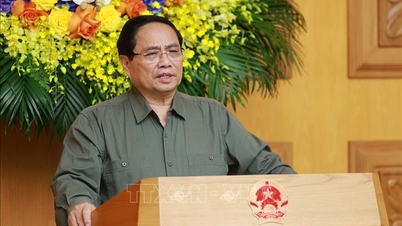

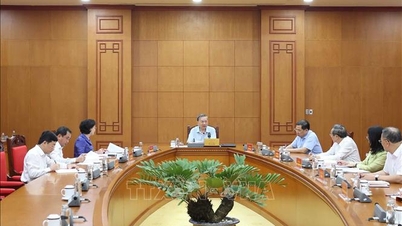
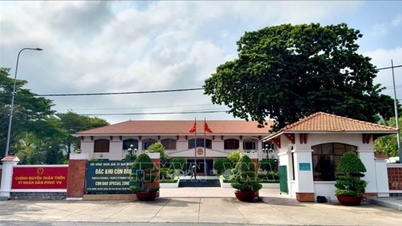



































































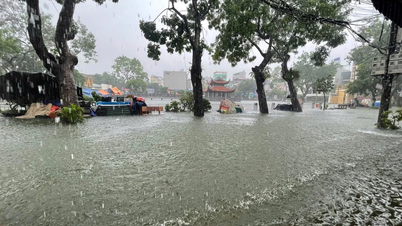



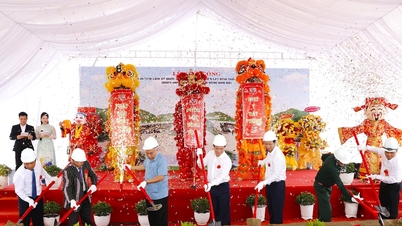














Comment (0)